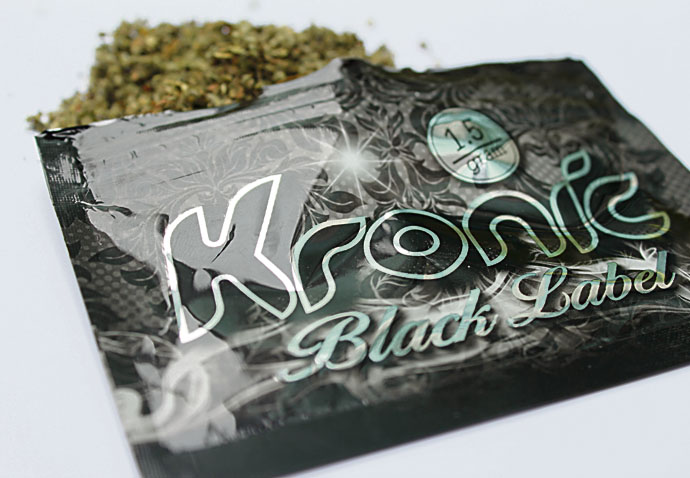From New Zealand to Camden, the story behind legal high ‘spice’ trade
Kronic suppliers moved to London after drug outlawed in New Zealand
Tuesday, 29th March 2016 — By William McLennan

A MAJOR supplier of synthetic cannabis said to be having a “devastating impact” on homeless addicts in Camden Town is based in a quiet residential cul-de-sac in west London, it can be revealed today.
The company behind Kronic, one of the so-called “legal highs” which have been blamed for an increase in rough sleeping in Camden, has been tracked down by the New Journal to a red-brick terraced home in a gated street in Putney.
Ben Thompson, who is registered as sole director of Dynamic Aromatics Limited, opened the door to the New Journal but refused to speak publicly when confronted with questions about the impact the drug is having on users.
The 33-year-old appeared visibly distressed when told that it was still being sold to teenagers and homeless addicts in Camden Town but further declined to comment when we contacted him again by phone.
Mr Thompson worked for the controversial company Lightyears Ahead, which was said to have made millions of dollars from the sale of Kronic in his native New Zealand until it was made illegal in 2014.
He was quoted by New Zealand media outlets as a spokesperson for Kronic, a brand that tried to cultivate a different image in New Zealand as a recreational drug popular among young adults. It was billed as a way of steering users away from unregulated black markets.

Matthew Wielenga was dubbed the “Kronic King” in New Zealand
It is understood that Mr Thompson had not foreseen how a substance apparently seen as a weekend drug in New Zealand could be used more chaotically by troubled homeless addicts on the streets in London’s more desperate corners. He is said now to be winding down operations.
Kronic, and other forms of synthetic cannabis grouped together by the street name “spice”, has been criticised in Camden Town for its impact on the homeless, affecting their attempts to build more stable lives. It can legally be sold, but bizarrely must bear the message: “Not fit for human consumption.”
The sale of the drug will be outlawed with the introduction of new legislation, the Psychoactive Substances Act 2016, expected to come into force early next month.
Camden Council began a clampdown on its sale last year using Trading Standards legislation designed to protect consumers, but officials and councillors admit they are aware that it is still being sold under the counter in NW1.
While only one of many “spice” products available, the Kronic brand was sold to a former addict working with the New Journal to test how easy it was to obtain, and also to police cadets, aged 16 and 17, carrying out test purchases within the past month.
The packet states: “May be harmful if swallowed. May be harmful if inhaled. No liability is accepted for any harm, loss or damage caused by the misuse of this product.”
The number of rough sleepers in Camden spiked last summer, with former “spice” users saying that people were moving in from as far afield as Brighton due to the ready availability of legal highs.
Outreach workers, who are employed by Camden Council to help get people off the streets, have said that “spice” is being widely used by addicts because of its low price and high potency.
Ian Bangay, project manager at the Camden Safer Streets Team, said: “It’s highly addictive and the impact it’s having is devastating. People are having psychotic episodes or blacking out, collapsing in the street.”
In New Zealand, Lightyears Ahead, which was owned by Matthew Wielenga, dubbed the Kronic King, was part of an industry lobby that organised a conference focusing on drug reform and the role synthetic cannabis could play in reducing the dangers faced by drug users.
Mr Wielenga did not respond this week to requests for a comment.
Before the ban was introduced, the New Zealand government had been attempting to regulate the sale of synthetic cannabis and some saw it as a missed opportunity to control drug use.
But Julie King, who spent months campaigning against the drug after seeing its impact on her community in Tokoroa, in the country’s North Island, said that making it illegal was the right way to go.
She added: “Don’t regulate it. Ban it. The best thing that can happen is to ban it. There’s been a huge improvement here since the banning.”
While it is still available on the black market, hospital admissions related to the use of synthetic cannabis had dropped off sharply since the ban, she said.
Mr Bangay said the idea that the legal high industry in this country was motivated by “harm reduction” was “incredible”, adding: “I use that word in its true meaning.”
Deej Sullivan, a writer who focuses on drug policy in the UK, said that the new legislation would not stop the trade and would simply “push the market underground”.
He said: “A more sensible option would have been to regulate legal highs more stringently, rather than just introduce this blanket ban.”
He said that the loophole that currently permits the sale of legal highs meant retailers could not provide any advice or information on their strength and was “the worst of both worlds”.
He said: “The main thing is that banning drugs doesn’t work. It doesn’t really protect anybody.
“The only reason we have these legal highs, that are completely untested, is because we have banned everything that we know about.”